冀教版(2019)选择性必修第三册Unit 2 Science Fiction单词讲义
文档属性
| 名称 | 冀教版(2019)选择性必修第三册Unit 2 Science Fiction单词讲义 |
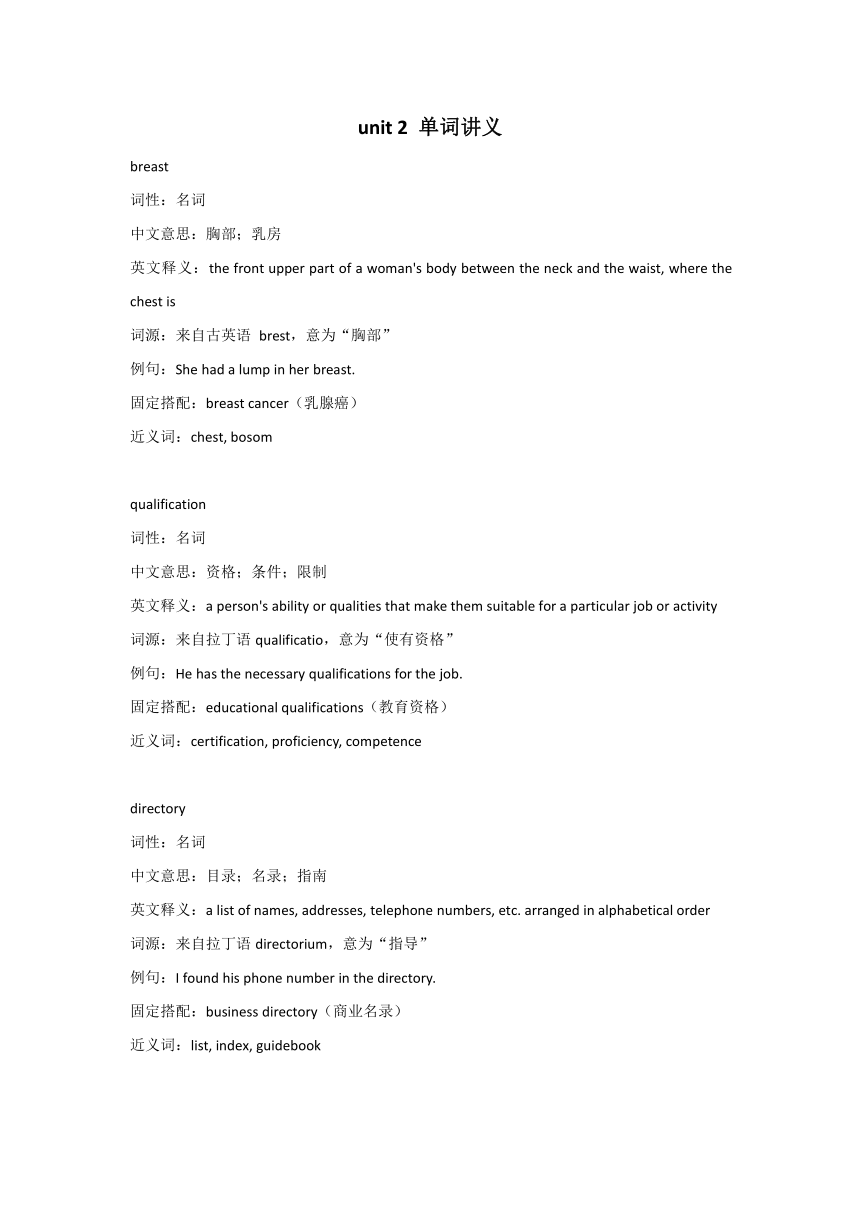
|
|
| 格式 | docx | ||
| 文件大小 | 33.6KB | ||
| 资源类型 | 教案 | ||
| 版本资源 | 冀教版(2019) | ||
| 科目 | 英语 | ||
| 更新时间 | 2024-01-19 09:38:34 | ||
图片预览

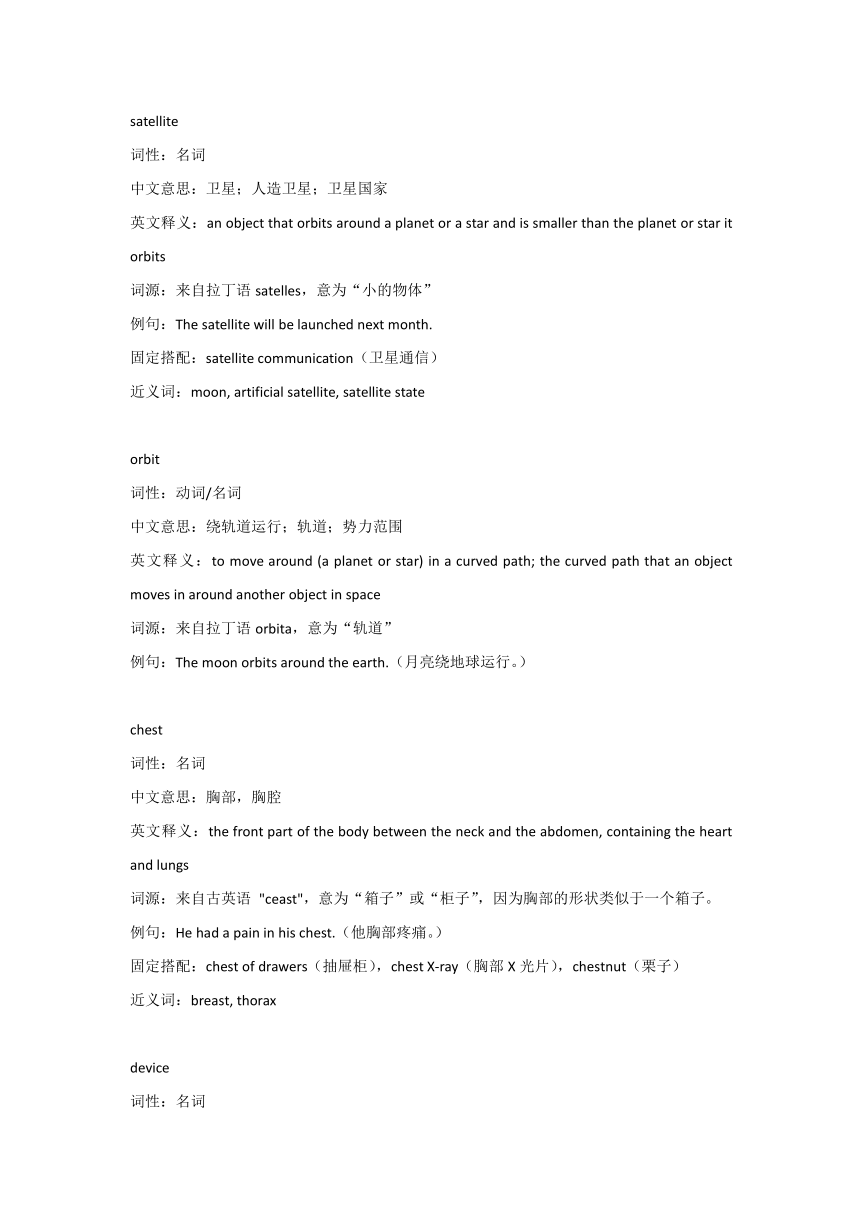
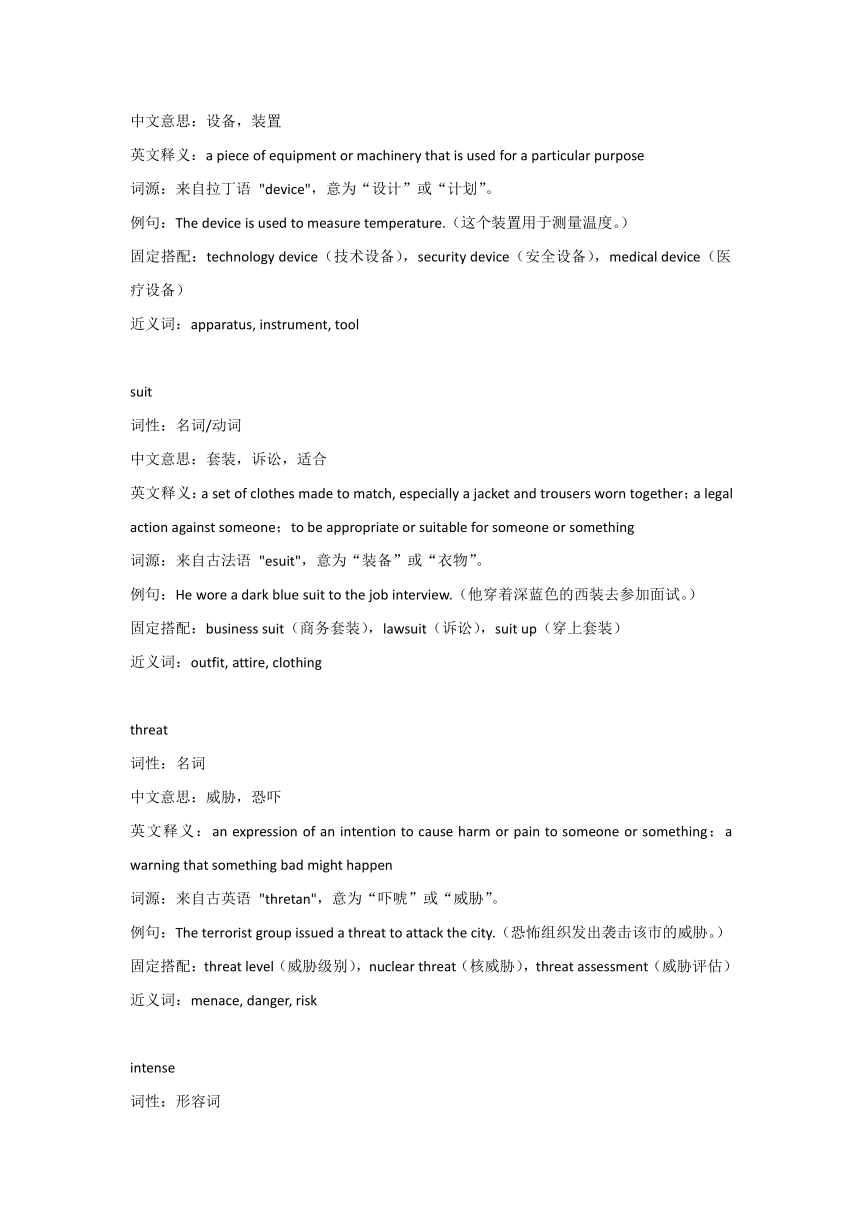
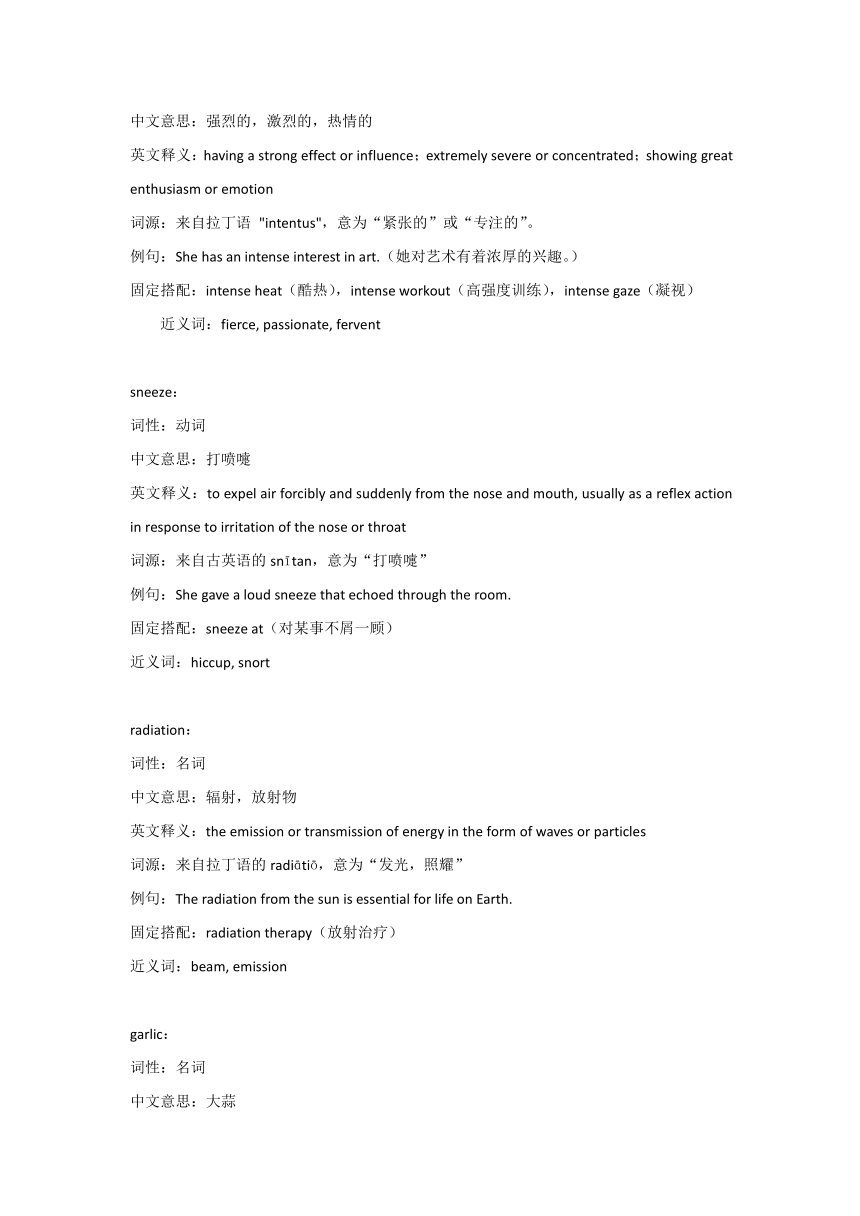
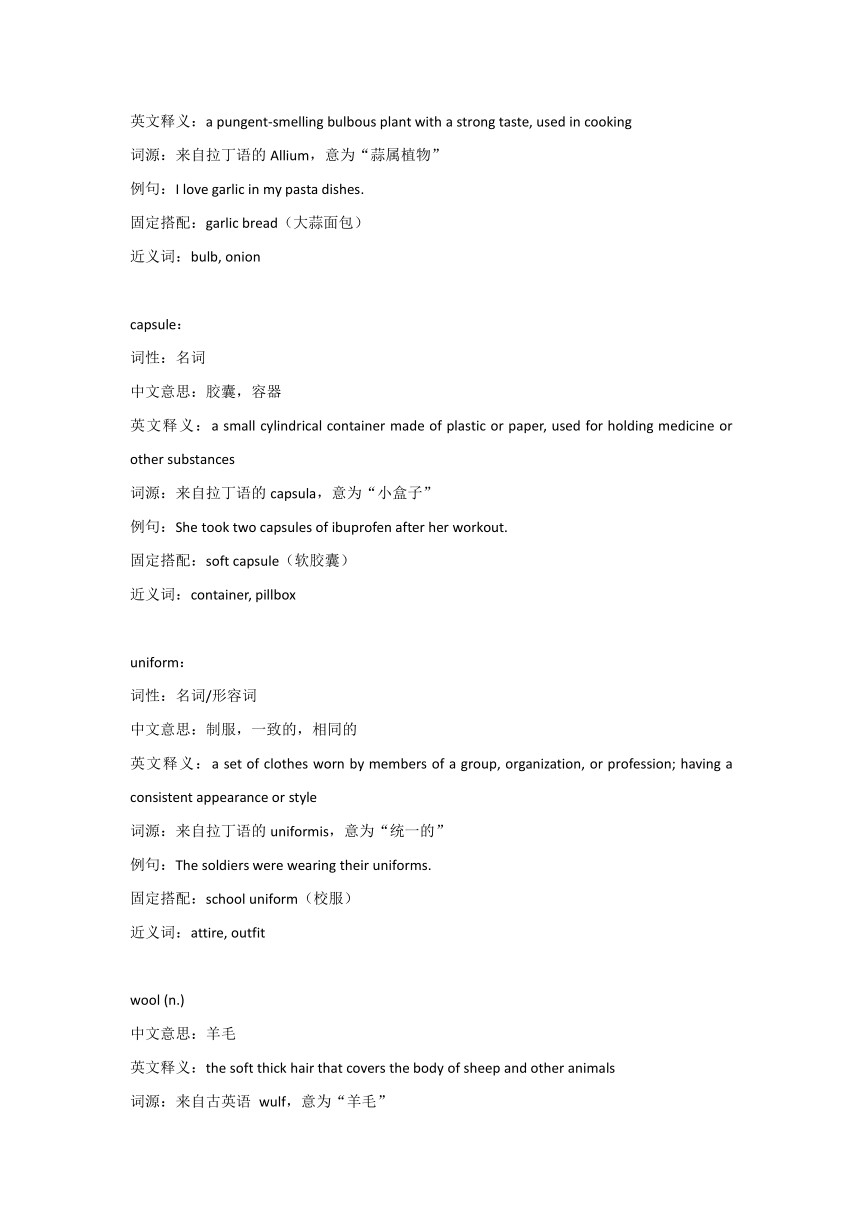
文档简介
unit 2 单词讲义
breast
词性:名词
中文意思:胸部;乳房
英文释义:the front upper part of a woman's body between the neck and the waist, where the chest is
词源:来自古英语 brest,意为“胸部”
例句:She had a lump in her breast.
固定搭配:breast cancer(乳腺癌)
近义词:chest, bosom
qualification
词性:名词
中文意思:资格;条件;限制
英文释义:a person's ability or qualities that make them suitable for a particular job or activity
词源:来自拉丁语qualificatio,意为“使有资格”
例句:He has the necessary qualifications for the job.
固定搭配:educational qualifications(教育资格)
近义词:certification, proficiency, competence
directory
词性:名词
中文意思:目录;名录;指南
英文释义:a list of names, addresses, telephone numbers, etc. arranged in alphabetical order
词源:来自拉丁语directorium,意为“指导”
例句:I found his phone number in the directory.
固定搭配:business directory(商业名录)
近义词:list, index, guidebook
satellite
词性:名词
中文意思:卫星;人造卫星;卫星国家
英文释义:an object that orbits around a planet or a star and is smaller than the planet or star it orbits
词源:来自拉丁语satelles,意为“小的物体”
例句:The satellite will be launched next month.
固定搭配:satellite communication(卫星通信)
近义词:moon, artificial satellite, satellite state
orbit
词性:动词/名词
中文意思:绕轨道运行;轨道;势力范围
英文释义:to move around (a planet or star) in a curved path; the curved path that an object moves in around another object in space
词源:来自拉丁语orbita,意为“轨道”
例句:The moon orbits around the earth.(月亮绕地球运行。)
chest
词性:名词
中文意思:胸部,胸腔
英文释义:the front part of the body between the neck and the abdomen, containing the heart and lungs
词源:来自古英语 "ceast",意为“箱子”或“柜子”,因为胸部的形状类似于一个箱子。
例句:He had a pain in his chest.(他胸部疼痛。)
固定搭配:chest of drawers(抽屉柜),chest X-ray(胸部X光片),chestnut(栗子)
近义词:breast, thorax
device
词性:名词
中文意思:设备,装置
英文释义:a piece of equipment or machinery that is used for a particular purpose
词源:来自拉丁语 "device",意为“设计”或“计划”。
例句:The device is used to measure temperature.(这个装置用于测量温度。)
固定搭配:technology device(技术设备),security device(安全设备),medical device(医疗设备)
近义词:apparatus, instrument, tool
suit
词性:名词/动词
中文意思:套装,诉讼,适合
英文释义:a set of clothes made to match, especially a jacket and trousers worn together;a legal action against someone;to be appropriate or suitable for someone or something
词源:来自古法语 "esuit",意为“装备”或“衣物”。
例句:He wore a dark blue suit to the job interview.(他穿着深蓝色的西装去参加面试。)
固定搭配:business suit(商务套装),lawsuit(诉讼),suit up(穿上套装)
近义词:outfit, attire, clothing
threat
词性:名词
中文意思:威胁,恐吓
英文释义:an expression of an intention to cause harm or pain to someone or something;a warning that something bad might happen
词源:来自古英语 "thretan",意为“吓唬”或“威胁”。
例句:The terrorist group issued a threat to attack the city.(恐怖组织发出袭击该市的威胁。)
固定搭配:threat level(威胁级别),nuclear threat(核威胁),threat assessment(威胁评估)
近义词:menace, danger, risk
intense
词性:形容词
中文意思:强烈的,激烈的,热情的
英文释义:having a strong effect or influence;extremely severe or concentrated;showing great enthusiasm or emotion
词源:来自拉丁语 "intentus",意为“紧张的”或“专注的”。
例句:She has an intense interest in art.(她对艺术有着浓厚的兴趣。)
固定搭配:intense heat(酷热),intense workout(高强度训练),intense gaze(凝视)
近义词:fierce, passionate, fervent
sneeze:
词性:动词
中文意思:打喷嚏
英文释义:to expel air forcibly and suddenly from the nose and mouth, usually as a reflex action in response to irritation of the nose or throat
词源:来自古英语的snītan,意为“打喷嚏”
例句:She gave a loud sneeze that echoed through the room.
固定搭配:sneeze at(对某事不屑一顾)
近义词:hiccup, snort
radiation:
词性:名词
中文意思:辐射,放射物
英文释义:the emission or transmission of energy in the form of waves or particles
词源:来自拉丁语的radiātiō,意为“发光,照耀”
例句:The radiation from the sun is essential for life on Earth.
固定搭配:radiation therapy(放射治疗)
近义词:beam, emission
garlic:
词性:名词
中文意思:大蒜
英文释义:a pungent-smelling bulbous plant with a strong taste, used in cooking
词源:来自拉丁语的Allium,意为“蒜属植物”
例句:I love garlic in my pasta dishes.
固定搭配:garlic bread(大蒜面包)
近义词:bulb, onion
capsule:
词性:名词
中文意思:胶囊,容器
英文释义:a small cylindrical container made of plastic or paper, used for holding medicine or other substances
词源:来自拉丁语的capsula,意为“小盒子”
例句:She took two capsules of ibuprofen after her workout.
固定搭配:soft capsule(软胶囊)
近义词:container, pillbox
uniform:
词性:名词/形容词
中文意思:制服,一致的,相同的
英文释义:a set of clothes worn by members of a group, organization, or profession; having a consistent appearance or style
词源:来自拉丁语的uniformis,意为“统一的”
例句:The soldiers were wearing their uniforms.
固定搭配:school uniform(校服)
近义词:attire, outfit
wool (n.)
中文意思:羊毛
英文释义:the soft thick hair that covers the body of sheep and other animals
词源:来自古英语 wulf,意为“羊毛”
例句:She wore a wool coat to keep warm in the winter.
固定搭配:wool fabric(羊毛织物), woolen sweater(羊毛衫)
近义词:fleece, fur
fabric (n.)
中文意思:织物;结构;构造
英文释义:a material made by weaving or knitting fibers, yarns, or threads together
词源:来自拉丁语 fabrica,意为“制造,构造”
例句:The dress is made of silk fabric.
固定搭配:fabric softener(织物柔软剂), cotton fabric(棉织物)
近义词:textile, material
backward (adj.)
中文意思:向后的;落后的;退步的
英文释义:moving or facing backward; not modern or advanced
词源:来自古英语 b cwār ,意为“向后的”
例句:He took a step backward when he saw the snake.
固定搭配:backward glance(向后瞥一眼), backward country(落后的国家)
近义词:retrograde, outdated
waist (n.)
中文意思:腰,腰部
英文释义:the part of the body between the ribs and the hips
词源:来自古英语 w sc,意为“腰带”
例句:She tied her skirt at the waist.
固定搭配:waistline(腰线), waistband(腰带)
近义词:torso, midriff
duration (n.)
中文意思:持续时间;期间
英文释义:the length of time something lasts or continues
词源:来自拉丁语 durare,意为“持续”
例句:The duration of the movie is two hours.
固定搭配:duration of stay(停留时间), life duration(寿命)
近义词:period, length
clue
词性:名词
中文意思:线索,提示
英文释义:a piece of information or evidence that helps to solve a problem or mystery
词源:来自拉丁语 "cluere",意为“关闭”或“封闭”,因为线索可以解开谜团。
例句:The detective found a clue that led him to the murderer.(侦探找到了一条线索,指向了凶手。)
固定搭配:clueless(无线索的,一无所知的),clue in(提供线索,告知秘密),clue to(关于……的线索)
近义词:hint, indication, suggestion
clone
词性:动词/名词
中文意思:克隆,复制
英文释义:to make an exact copy of something or someone using cells from that thing or person
词源:来自希腊语 "klon",意为“枝干”或“嫩枝”,因为克隆是通过细胞分裂产生的。
例句:Scientists have successfully cloned sheep.(科学家已经成功克隆了羊。)
固定搭配:clone technology(克隆技术),clone organs(克隆器官),clone experiment(克隆实验)
近义词:duplicate, replicate, reproduce
choke
词性:动词
中文意思:窒息,噎住
英文释义:to be unable to breathe properly because something is blocking your throat or airway
词源:来自古英语 "cnawan",意为“窒息”。
例句:She almost choked on a piece of meat.(她差点被一块肉噎住。)
固定搭配:choke back tears(强忍住眼泪),choke up(激动得说不出话来),choke off(切断,阻止)
近义词:strangle, asphyxiate, suffocate
exposure
词性:名词
中文意思:暴露,曝光
英文释义:the state of being exposed to something, especially harmful substances or dangerous situations
词源:来自中古英语 "exposicioun",意为“揭露,显露”。
例句:The patient's exposure to radiation was minimal.(患者暴露在辐射下的时间非常短。)
固定搭配:exposure therapy(暴露疗法),exposure risk(暴露风险),exposure level(曝光水平)
近义词:disclosure, revelation, unveiling
microscope
词性:名词
中文意思:显微镜
英文释义:an instrument used for making very small objects appear larger so that they can be seen more clearly
词源:来自希腊语 "mikros",意为“小”,加上 "skopein",意为“看”,合起来表示“看小东西的工具”。
例句:The scientist used a microscope to examine the specimen under high magnification.(科学家使用显微镜在高倍镜下观察标本。)
固定搭配:optical microscope(光学显微镜),electron microscope(电子显微镜),compound microscope(复合显微镜)
damp
词性:形容词
中文意思:潮湿的,有湿气的
英文释义:slightly wet or covered in moisture
词源:来自古英语的dampian,意为“吸湿”
例句:The ground was damp after the rain.
固定搭配:damp cloth, damp weather, damp room
近义词:humid, moist, soggy
towel
词性:名词
中文意思:毛巾
英文释义:a piece of absorbent cloth or paper used for drying oneself or wiping things dry
词源:来自拉丁语的tovarium,意为“小布”
例句:She dried her hands with a towel.
固定搭配:bath towel, hand towel, beach towel
近义词:towelette, rag, cloth
forehead
词性:名词
中文意思:额头
英文释义:the front part of the head above the eyes and below the hairline
词源:来自古英语的foreheafod,意为“前额”
例句:She had a headache and rubbed her forehead.
固定搭配:forehead wrinkles, sweat on forehead, high forehead
近义词:brow, browline, temple
pessimistic
词性:形容词
中文意思:悲观的,消极的
英文释义:believing that bad things will happen or are likely to happen
词源:来自希腊语的pōsimos,意为“最坏的”和istikos,意为“观照”或“判断”
例句:He is always pessimistic about his future.
固定搭配:pessimistic outlook, pessimistic attitude, pessimistic view
近义词:dismal, gloomy, negative
emergency
词性:名词
中文意思:紧急情况,突发事件
英文释义:a serious unexpected event that needs immediate action to deal with it
词源:来自拉丁语的emergere,意为“出现”或“冒出”
例句:The hospital has an emergency department for treating emergencies.
固定搭配:emergency room, emergency kit, emergency plan
近义词:crisis, disaster, urgency
backup:
词性:名词、动词
中文意思:备份,支持
英文释义:1. a copy of computer files or programs that can be used if the originals are lost or damaged 2. to support or help someone or something
词源:来自美国英语,由“back”和“up”组成,表示“向后”和“向上”,引申为“支持”和“备份”。
例句:I always make a backup of my important files.(我总是备份我的重要文件。)
固定搭配:data backup(数据备份)、backup plan(备份计划)、in backup(作为后备)
近义词:support, reinforcement
solar:
词性:形容词
中文意思:太阳的,太阳能的
英文释义:relating to the sun or its energy
词源:来自拉丁语“solare”,意为“阳光的”。
例句:The solar panels generate electricity from sunlight.(太阳能电池板从阳光中产生电能。)
固定搭配:solar energy(太阳能)、solar system(太阳系)、solar power(太阳能)
近义词:sun-powered, heliocentric
pretend:
词性:动词
中文意思:假装,伪装
英文释义:to give a false impression of; to make believe
词源:来自古法语“prétendre”,意为“主张,声称”。
例句:She pretended to be asleep when her mother came into the room.(她假装在睡觉,当她妈妈走进房间时。)
固定搭配:pretend to do something(假装做某事)、pretend not to know(假装不知道)、pretend friend(假朋友)
近义词:feign, simulate, sham
convince:
词性:动词
中文意思:使确信,说服
英文释义:to make someone feel certain about something or persuade them to do something
词源:来自拉丁语“convinciare”,意为“使确信”。
例句:He convinced me to go to the party with him.(他说服我和他一起去参加派对。)
固定搭配:convince someone of something(使某人相信某事)、be convinced(被说服)、convince oneself(使自己相信)
近义词:persuade, convince, win over
shadow:
词性:名词、动词
中文意思:阴影,影子;跟踪,尾随
英文释义:1. a dark shape produced by an object blocking rays of light 2. to follow closely behind someone or something in order to watch them secretly
词源:来自古英语“scede”,意为“跟随”。
例句:The tree cast a shadow on the ground.(树在地上投下了阴影。)
leather
词性:名词
中文意思:皮革
英文释义:a material made from the skin of animals, used for making clothes, shoes, bags etc.
词源:来自古英语"leactra",意为“皮肤”或“皮革”。
例句:He bought a new leather jacket yesterday.
固定搭配:leather gloves, leather shoes, leather bag
近义词:hide, pelt
comparison
词性:名词
中文意思:比较,对比
英文释义:the act of comparing two or more things
词源:来自拉丁语"comparare",意为“比较”。
例句:In comparison with last year, our sales have increased by 20%.
固定搭配:make a comparison, in comparison to, beyond comparison
近义词:contrast, evaluation
finding
词性:名词
中文意思:发现,调查结果
英文释义:something that is discovered or learned, especially as the result of an investigation or study
词源:来自古英语"findan",意为“找到”或“发现”。
例句:The findings of the research were published in a scientific journal.
固定搭配:scientific findings, groundbreaking findings, important findings
近义词:discovery, result, conclusion
crisis
词性:名词
中文意思:危机,紧要关头
英文释义:a time of great difficulty or danger, when a difficult situation must be dealt with quickly and effectively
词源:来自希腊语"krisis",意为“决定”或“选择”。
例句:The company is facing a financial crisis.
固定搭配:economic crisis, financial crisis, global crisis
近义词:crisis point, emergency, disaster
monitor
词性:动词/名词
中文意思:监控,监视;显示器
英文释义:verb: to watch carefully and control; noun: a device that shows information or images from a computer or other system.
词源:来自拉丁语"monitorium",意为“警告”或“观察”。
例句:The teacher monitors the students' progress closely. (动词) The monitor on my computer is broken. (名词)
adjust
词性:动词
中文意思:调整,调节
英文释义:to change slightly in order to make something more suitable or accurate
词源:来自拉丁语adjustare,意为“使适合,使适应”
例句:Can you adjust the temperature of the room
固定搭配:adjust to适应,调整;adjust oneself自我调整
近义词:modify, regulate, adapt
quantity
词性:名词
中文意思:数量,量
英文释义:the amount or number of sth that is being measured or counted
词源:来自拉丁语quantitas,意为“大小,数量”
例句:The quantity of sugar in this recipe is too much.
固定搭配:a large/small quantity大量/少量;in quantity大量地
近义词:amount, number, volume
polish
词性:动词、名词
中文意思:动词:擦亮,磨光;名词:光泽,优雅
英文释义:verb: to make smooth and shiny by rubbing; noun: a smooth shiny surface or appearance
词源:来自中古英语polisn,意为“擦亮,磨光”
例句:She polished the silverware until it shone.(她把银器擦得闪闪发光。)His speech was full of polish and elegance.(他的演讲充满了优雅和风度。)
固定搭配:polish off迅速完成;polish up提高,改善;polish one's English提高某人的英语水平
近义词:shine, refine, improve
automatic
词性:形容词、名词
中文意思:形容词:自动的;名词:自动装置
英文释义:adjective: working by itself without needing control from someone else; noun: a machine or device that works by itself without needing control from someone else
词源:来自法语automatique,意为“自动的”
例句:The doors opened automatically when she approached them.(当她走近时,门自动打开了。)The car has an automatic transmission.(这辆车有自动变速器。)
固定搭配:automatic pilot自动驾驶仪;automatic weapon自动武器;automatic door自动门
近义词:self-operating, self-regulating, mechanical
contrary
词性:形容词、副词、名词
中文意思:形容词:相反的;副词:相反地;名词:反对者,矛盾的事物
英文释义:adjective: opposite in nature or direction; adverb: in a way that is opposite to what is expected or usual; noun: a person who disagrees with another person or group of people
词源:来自拉丁语contrarius,意为“相对的,相反的”
例句:Her actions were contrary to her words.(她的行动与她的话相反。)He acted contrary to my advice.(他的行为与我的建议相反。)They are the contrary of each other.(他们彼此相反。)
alternative
词性:形容词/名词
中文意思:可替代的,选择性的
英文释义:relating to or offering a choice between two or more possibilities
词源:来自拉丁语alternativus,意为“交替的”
例句:We have no alternative but to cancel the event due to bad weather.
固定搭配:have no alternative but to do sth.(别无选择,只能做某事)
近义词:optional, elective, substitute
highlight
词性:动词/名词
中文意思:强调,突出
英文释义:to emphasize or give prominence to something
词源:来自古英语healdan,意为“照亮,使明亮”
例句:The report highlights the need for increased funding.
固定搭配:highlight the key points(突出重点)
近义词:emphasize, underline, spotlight
influential
词性:形容词
中文意思:有影响力的,有势力的
英文释义:having the power to affect or shape events, situations, etc.
词源:来自拉丁语influentia,意为“流入,影响”
例句:She is an influential figure in the fashion industry.
固定搭配:be influential in sth.(在某方面有影响力)
近义词:powerful, impactful, significant
classic
词性:形容词/名词
中文意思:经典的,典型的
英文释义:typical of the best and most respected examples of its kind
词源:来自拉丁语classicus,意为“第一流的”
例句:This is a classic example of how not to behave in public.
固定搭配:classic car(经典汽车)
近义词:traditional, timeless, iconic
entitle
词性:动词
中文意思:给…权利,给…资格
英文释义:to give someone the right to do or have something
词源:来自中古英语entiten,意为“给予权利”
例句:Your membership entitles you to discounts on our products.
固定搭配:entitle sb. to sth.(赋予某人某物的权利)
substantial
词性:形容词
中文意思:大量的,实质的,坚固的
英文释义:large in amount or size; solid and strong
词源:来自拉丁语substantia,意为“物质,实体”
例句:The company has made substantial progress in the last year.
固定搭配:substantial improvement, substantial increase, substantial change
近义词:significant, considerable, ample, solid
widespread
词性:形容词
中文意思:广泛的,普遍的
英文释义:existing or happening over a large area or among many people
词源:来自中古英语wide + spread,意为“广泛分布的”
例句:The disease is now widespread throughout the country.
固定搭配:widespread concern, widespread use, widespread agreement
近义词:extensive, extensive, far-reaching, universal
remarkable
词性:形容词
中文意思:显著的,非凡的,值得注意的
英文释义:deserving attention or notice because of being unusual or excellent
词源:来自拉丁语remarkari,意为“评论,观察”
例句:She has made remarkable progress in her studies.
固定搭配:remarkable achievement, remarkable success, remarkable talent
近义词:notable, exceptional, outstanding, exceptional
innovation
词性:名词
中文意思:创新,革新,新方法
英文释义:a new method, idea, product, etc. that has been created
词源:来自拉丁语innovare,意为“更新,重新开始”
例句:The company's success is due to its constant innovation.
固定搭配:technological innovation, business innovation, scientific innovation
近义词:invention, creation, novelty, advancement
practical
词性:形容词
中文意思:实际的,实用的,实践的
英文释义:related to real situations and actions rather than ideas or theories
词源:来自拉丁语pragmaticus,意为“实用的”
例句:It's important to have practical experience in this field.
固定搭配:practical skills, practical knowledge, practical application
近义词:useful, functional, effective, down-to-earth
suspect
词性:动词、名词
中文意思:怀疑,嫌疑人
英文释义:动词 - to have a feeling that something is true or likely; 名词 - a person who is suspected of doing something wrong
词源:来自拉丁语 suspectus,意为“可疑的”
例句:I suspect that he is lying.(我怀疑他在说谎。)
固定搭配:be a suspect in a crime(是犯罪的嫌疑人)
近义词:doubt, distrust, mistrust
estimate
词性:动词、名词
中文意思:估计,评估
英文释义:动词 - to form an opinion about the amount or value of something; 名词 - an approximate calculation or calculation based on probability
词源:来自拉丁语 exprimere,意为“表达”
例句:We estimated the cost of the project at $100,000.(我们估计这个项目的成本为10万美元。)
固定搭配:estimate the time needed(估计所需的时间)
近义词:evaluate, appraise, assess
transform
词性:动词
中文意思:转变,改变
英文释义:to change completely the appearance or character of someone or something
词源:来自拉丁语 transformare,意为“改变形状”
例句:The new technology has transformed the way we communicate.(新技术改变了我们的沟通方式。)
固定搭配:transform into(转变为)
近义词:convert, alter, modify
emerge
词性:动词
中文意思:出现,显露
英文释义:to come out of hiding or be seen for the first time
词源:来自拉丁语 emergere,意为“出现”
例句:The sun emerged from behind the clouds.(太阳从云层后面露出来了。)
固定搭配:emerge from(从...中出现)
近义词:appear, come out, surface
respective
词性:形容词
中文意思:各自的,分别的
英文释义:belonging separately to each one of two or more people or things considered separately; individual
词源:来自拉丁语 "respectivus",意为“分别的”
例句:They went to their respective homes.
固定搭配:respecftive rights/responsibilities, respective parties
近义词:individual, separate, personal
consequence
词性:名词
中文意思:结果,后果
英文释义:a result or effect that follows an event or action
词源:来自拉丁语 "consequentia",意为“跟随”
例句:The consequence of his actions was disastrous.
固定搭配:in consequence, as a consequence, for this consequence
近义词:result, outcome, aftermath
threaten
词性:动词
中文意思:威胁,恐吓
英文释义:to express a threat against (someone) or to be likely to cause harm or damage to (something)
词源:来自古英语 "thretan",意为“威胁”
例句:The company threatened to fire any employee who broke the rules.
固定搭配:threaten with, threaten to do, threaten sb. into doing sth.
近义词:menace, intimidate, bully
phenomenon
词性:名词
中文意思:现象,奇迹
英文释义:an observable fact or occurrence, especially one that is unusual or surprising
词源:来自希腊语 "phainomenon",意为“显现出来的东西”
例句:The rise of social media is a global phenomenon.
固定搭配:natural phenomenon, social phenomenon, cultural phenomenon
近义词:occurrence, event, wonder
breast
词性:名词
中文意思:胸部;乳房
英文释义:the front upper part of a woman's body between the neck and the waist, where the chest is
词源:来自古英语 brest,意为“胸部”
例句:She had a lump in her breast.
固定搭配:breast cancer(乳腺癌)
近义词:chest, bosom
qualification
词性:名词
中文意思:资格;条件;限制
英文释义:a person's ability or qualities that make them suitable for a particular job or activity
词源:来自拉丁语qualificatio,意为“使有资格”
例句:He has the necessary qualifications for the job.
固定搭配:educational qualifications(教育资格)
近义词:certification, proficiency, competence
directory
词性:名词
中文意思:目录;名录;指南
英文释义:a list of names, addresses, telephone numbers, etc. arranged in alphabetical order
词源:来自拉丁语directorium,意为“指导”
例句:I found his phone number in the directory.
固定搭配:business directory(商业名录)
近义词:list, index, guidebook
satellite
词性:名词
中文意思:卫星;人造卫星;卫星国家
英文释义:an object that orbits around a planet or a star and is smaller than the planet or star it orbits
词源:来自拉丁语satelles,意为“小的物体”
例句:The satellite will be launched next month.
固定搭配:satellite communication(卫星通信)
近义词:moon, artificial satellite, satellite state
orbit
词性:动词/名词
中文意思:绕轨道运行;轨道;势力范围
英文释义:to move around (a planet or star) in a curved path; the curved path that an object moves in around another object in space
词源:来自拉丁语orbita,意为“轨道”
例句:The moon orbits around the earth.(月亮绕地球运行。)
chest
词性:名词
中文意思:胸部,胸腔
英文释义:the front part of the body between the neck and the abdomen, containing the heart and lungs
词源:来自古英语 "ceast",意为“箱子”或“柜子”,因为胸部的形状类似于一个箱子。
例句:He had a pain in his chest.(他胸部疼痛。)
固定搭配:chest of drawers(抽屉柜),chest X-ray(胸部X光片),chestnut(栗子)
近义词:breast, thorax
device
词性:名词
中文意思:设备,装置
英文释义:a piece of equipment or machinery that is used for a particular purpose
词源:来自拉丁语 "device",意为“设计”或“计划”。
例句:The device is used to measure temperature.(这个装置用于测量温度。)
固定搭配:technology device(技术设备),security device(安全设备),medical device(医疗设备)
近义词:apparatus, instrument, tool
suit
词性:名词/动词
中文意思:套装,诉讼,适合
英文释义:a set of clothes made to match, especially a jacket and trousers worn together;a legal action against someone;to be appropriate or suitable for someone or something
词源:来自古法语 "esuit",意为“装备”或“衣物”。
例句:He wore a dark blue suit to the job interview.(他穿着深蓝色的西装去参加面试。)
固定搭配:business suit(商务套装),lawsuit(诉讼),suit up(穿上套装)
近义词:outfit, attire, clothing
threat
词性:名词
中文意思:威胁,恐吓
英文释义:an expression of an intention to cause harm or pain to someone or something;a warning that something bad might happen
词源:来自古英语 "thretan",意为“吓唬”或“威胁”。
例句:The terrorist group issued a threat to attack the city.(恐怖组织发出袭击该市的威胁。)
固定搭配:threat level(威胁级别),nuclear threat(核威胁),threat assessment(威胁评估)
近义词:menace, danger, risk
intense
词性:形容词
中文意思:强烈的,激烈的,热情的
英文释义:having a strong effect or influence;extremely severe or concentrated;showing great enthusiasm or emotion
词源:来自拉丁语 "intentus",意为“紧张的”或“专注的”。
例句:She has an intense interest in art.(她对艺术有着浓厚的兴趣。)
固定搭配:intense heat(酷热),intense workout(高强度训练),intense gaze(凝视)
近义词:fierce, passionate, fervent
sneeze:
词性:动词
中文意思:打喷嚏
英文释义:to expel air forcibly and suddenly from the nose and mouth, usually as a reflex action in response to irritation of the nose or throat
词源:来自古英语的snītan,意为“打喷嚏”
例句:She gave a loud sneeze that echoed through the room.
固定搭配:sneeze at(对某事不屑一顾)
近义词:hiccup, snort
radiation:
词性:名词
中文意思:辐射,放射物
英文释义:the emission or transmission of energy in the form of waves or particles
词源:来自拉丁语的radiātiō,意为“发光,照耀”
例句:The radiation from the sun is essential for life on Earth.
固定搭配:radiation therapy(放射治疗)
近义词:beam, emission
garlic:
词性:名词
中文意思:大蒜
英文释义:a pungent-smelling bulbous plant with a strong taste, used in cooking
词源:来自拉丁语的Allium,意为“蒜属植物”
例句:I love garlic in my pasta dishes.
固定搭配:garlic bread(大蒜面包)
近义词:bulb, onion
capsule:
词性:名词
中文意思:胶囊,容器
英文释义:a small cylindrical container made of plastic or paper, used for holding medicine or other substances
词源:来自拉丁语的capsula,意为“小盒子”
例句:She took two capsules of ibuprofen after her workout.
固定搭配:soft capsule(软胶囊)
近义词:container, pillbox
uniform:
词性:名词/形容词
中文意思:制服,一致的,相同的
英文释义:a set of clothes worn by members of a group, organization, or profession; having a consistent appearance or style
词源:来自拉丁语的uniformis,意为“统一的”
例句:The soldiers were wearing their uniforms.
固定搭配:school uniform(校服)
近义词:attire, outfit
wool (n.)
中文意思:羊毛
英文释义:the soft thick hair that covers the body of sheep and other animals
词源:来自古英语 wulf,意为“羊毛”
例句:She wore a wool coat to keep warm in the winter.
固定搭配:wool fabric(羊毛织物), woolen sweater(羊毛衫)
近义词:fleece, fur
fabric (n.)
中文意思:织物;结构;构造
英文释义:a material made by weaving or knitting fibers, yarns, or threads together
词源:来自拉丁语 fabrica,意为“制造,构造”
例句:The dress is made of silk fabric.
固定搭配:fabric softener(织物柔软剂), cotton fabric(棉织物)
近义词:textile, material
backward (adj.)
中文意思:向后的;落后的;退步的
英文释义:moving or facing backward; not modern or advanced
词源:来自古英语 b cwār ,意为“向后的”
例句:He took a step backward when he saw the snake.
固定搭配:backward glance(向后瞥一眼), backward country(落后的国家)
近义词:retrograde, outdated
waist (n.)
中文意思:腰,腰部
英文释义:the part of the body between the ribs and the hips
词源:来自古英语 w sc,意为“腰带”
例句:She tied her skirt at the waist.
固定搭配:waistline(腰线), waistband(腰带)
近义词:torso, midriff
duration (n.)
中文意思:持续时间;期间
英文释义:the length of time something lasts or continues
词源:来自拉丁语 durare,意为“持续”
例句:The duration of the movie is two hours.
固定搭配:duration of stay(停留时间), life duration(寿命)
近义词:period, length
clue
词性:名词
中文意思:线索,提示
英文释义:a piece of information or evidence that helps to solve a problem or mystery
词源:来自拉丁语 "cluere",意为“关闭”或“封闭”,因为线索可以解开谜团。
例句:The detective found a clue that led him to the murderer.(侦探找到了一条线索,指向了凶手。)
固定搭配:clueless(无线索的,一无所知的),clue in(提供线索,告知秘密),clue to(关于……的线索)
近义词:hint, indication, suggestion
clone
词性:动词/名词
中文意思:克隆,复制
英文释义:to make an exact copy of something or someone using cells from that thing or person
词源:来自希腊语 "klon",意为“枝干”或“嫩枝”,因为克隆是通过细胞分裂产生的。
例句:Scientists have successfully cloned sheep.(科学家已经成功克隆了羊。)
固定搭配:clone technology(克隆技术),clone organs(克隆器官),clone experiment(克隆实验)
近义词:duplicate, replicate, reproduce
choke
词性:动词
中文意思:窒息,噎住
英文释义:to be unable to breathe properly because something is blocking your throat or airway
词源:来自古英语 "cnawan",意为“窒息”。
例句:She almost choked on a piece of meat.(她差点被一块肉噎住。)
固定搭配:choke back tears(强忍住眼泪),choke up(激动得说不出话来),choke off(切断,阻止)
近义词:strangle, asphyxiate, suffocate
exposure
词性:名词
中文意思:暴露,曝光
英文释义:the state of being exposed to something, especially harmful substances or dangerous situations
词源:来自中古英语 "exposicioun",意为“揭露,显露”。
例句:The patient's exposure to radiation was minimal.(患者暴露在辐射下的时间非常短。)
固定搭配:exposure therapy(暴露疗法),exposure risk(暴露风险),exposure level(曝光水平)
近义词:disclosure, revelation, unveiling
microscope
词性:名词
中文意思:显微镜
英文释义:an instrument used for making very small objects appear larger so that they can be seen more clearly
词源:来自希腊语 "mikros",意为“小”,加上 "skopein",意为“看”,合起来表示“看小东西的工具”。
例句:The scientist used a microscope to examine the specimen under high magnification.(科学家使用显微镜在高倍镜下观察标本。)
固定搭配:optical microscope(光学显微镜),electron microscope(电子显微镜),compound microscope(复合显微镜)
damp
词性:形容词
中文意思:潮湿的,有湿气的
英文释义:slightly wet or covered in moisture
词源:来自古英语的dampian,意为“吸湿”
例句:The ground was damp after the rain.
固定搭配:damp cloth, damp weather, damp room
近义词:humid, moist, soggy
towel
词性:名词
中文意思:毛巾
英文释义:a piece of absorbent cloth or paper used for drying oneself or wiping things dry
词源:来自拉丁语的tovarium,意为“小布”
例句:She dried her hands with a towel.
固定搭配:bath towel, hand towel, beach towel
近义词:towelette, rag, cloth
forehead
词性:名词
中文意思:额头
英文释义:the front part of the head above the eyes and below the hairline
词源:来自古英语的foreheafod,意为“前额”
例句:She had a headache and rubbed her forehead.
固定搭配:forehead wrinkles, sweat on forehead, high forehead
近义词:brow, browline, temple
pessimistic
词性:形容词
中文意思:悲观的,消极的
英文释义:believing that bad things will happen or are likely to happen
词源:来自希腊语的pōsimos,意为“最坏的”和istikos,意为“观照”或“判断”
例句:He is always pessimistic about his future.
固定搭配:pessimistic outlook, pessimistic attitude, pessimistic view
近义词:dismal, gloomy, negative
emergency
词性:名词
中文意思:紧急情况,突发事件
英文释义:a serious unexpected event that needs immediate action to deal with it
词源:来自拉丁语的emergere,意为“出现”或“冒出”
例句:The hospital has an emergency department for treating emergencies.
固定搭配:emergency room, emergency kit, emergency plan
近义词:crisis, disaster, urgency
backup:
词性:名词、动词
中文意思:备份,支持
英文释义:1. a copy of computer files or programs that can be used if the originals are lost or damaged 2. to support or help someone or something
词源:来自美国英语,由“back”和“up”组成,表示“向后”和“向上”,引申为“支持”和“备份”。
例句:I always make a backup of my important files.(我总是备份我的重要文件。)
固定搭配:data backup(数据备份)、backup plan(备份计划)、in backup(作为后备)
近义词:support, reinforcement
solar:
词性:形容词
中文意思:太阳的,太阳能的
英文释义:relating to the sun or its energy
词源:来自拉丁语“solare”,意为“阳光的”。
例句:The solar panels generate electricity from sunlight.(太阳能电池板从阳光中产生电能。)
固定搭配:solar energy(太阳能)、solar system(太阳系)、solar power(太阳能)
近义词:sun-powered, heliocentric
pretend:
词性:动词
中文意思:假装,伪装
英文释义:to give a false impression of; to make believe
词源:来自古法语“prétendre”,意为“主张,声称”。
例句:She pretended to be asleep when her mother came into the room.(她假装在睡觉,当她妈妈走进房间时。)
固定搭配:pretend to do something(假装做某事)、pretend not to know(假装不知道)、pretend friend(假朋友)
近义词:feign, simulate, sham
convince:
词性:动词
中文意思:使确信,说服
英文释义:to make someone feel certain about something or persuade them to do something
词源:来自拉丁语“convinciare”,意为“使确信”。
例句:He convinced me to go to the party with him.(他说服我和他一起去参加派对。)
固定搭配:convince someone of something(使某人相信某事)、be convinced(被说服)、convince oneself(使自己相信)
近义词:persuade, convince, win over
shadow:
词性:名词、动词
中文意思:阴影,影子;跟踪,尾随
英文释义:1. a dark shape produced by an object blocking rays of light 2. to follow closely behind someone or something in order to watch them secretly
词源:来自古英语“scede”,意为“跟随”。
例句:The tree cast a shadow on the ground.(树在地上投下了阴影。)
leather
词性:名词
中文意思:皮革
英文释义:a material made from the skin of animals, used for making clothes, shoes, bags etc.
词源:来自古英语"leactra",意为“皮肤”或“皮革”。
例句:He bought a new leather jacket yesterday.
固定搭配:leather gloves, leather shoes, leather bag
近义词:hide, pelt
comparison
词性:名词
中文意思:比较,对比
英文释义:the act of comparing two or more things
词源:来自拉丁语"comparare",意为“比较”。
例句:In comparison with last year, our sales have increased by 20%.
固定搭配:make a comparison, in comparison to, beyond comparison
近义词:contrast, evaluation
finding
词性:名词
中文意思:发现,调查结果
英文释义:something that is discovered or learned, especially as the result of an investigation or study
词源:来自古英语"findan",意为“找到”或“发现”。
例句:The findings of the research were published in a scientific journal.
固定搭配:scientific findings, groundbreaking findings, important findings
近义词:discovery, result, conclusion
crisis
词性:名词
中文意思:危机,紧要关头
英文释义:a time of great difficulty or danger, when a difficult situation must be dealt with quickly and effectively
词源:来自希腊语"krisis",意为“决定”或“选择”。
例句:The company is facing a financial crisis.
固定搭配:economic crisis, financial crisis, global crisis
近义词:crisis point, emergency, disaster
monitor
词性:动词/名词
中文意思:监控,监视;显示器
英文释义:verb: to watch carefully and control; noun: a device that shows information or images from a computer or other system.
词源:来自拉丁语"monitorium",意为“警告”或“观察”。
例句:The teacher monitors the students' progress closely. (动词) The monitor on my computer is broken. (名词)
adjust
词性:动词
中文意思:调整,调节
英文释义:to change slightly in order to make something more suitable or accurate
词源:来自拉丁语adjustare,意为“使适合,使适应”
例句:Can you adjust the temperature of the room
固定搭配:adjust to适应,调整;adjust oneself自我调整
近义词:modify, regulate, adapt
quantity
词性:名词
中文意思:数量,量
英文释义:the amount or number of sth that is being measured or counted
词源:来自拉丁语quantitas,意为“大小,数量”
例句:The quantity of sugar in this recipe is too much.
固定搭配:a large/small quantity大量/少量;in quantity大量地
近义词:amount, number, volume
polish
词性:动词、名词
中文意思:动词:擦亮,磨光;名词:光泽,优雅
英文释义:verb: to make smooth and shiny by rubbing; noun: a smooth shiny surface or appearance
词源:来自中古英语polisn,意为“擦亮,磨光”
例句:She polished the silverware until it shone.(她把银器擦得闪闪发光。)His speech was full of polish and elegance.(他的演讲充满了优雅和风度。)
固定搭配:polish off迅速完成;polish up提高,改善;polish one's English提高某人的英语水平
近义词:shine, refine, improve
automatic
词性:形容词、名词
中文意思:形容词:自动的;名词:自动装置
英文释义:adjective: working by itself without needing control from someone else; noun: a machine or device that works by itself without needing control from someone else
词源:来自法语automatique,意为“自动的”
例句:The doors opened automatically when she approached them.(当她走近时,门自动打开了。)The car has an automatic transmission.(这辆车有自动变速器。)
固定搭配:automatic pilot自动驾驶仪;automatic weapon自动武器;automatic door自动门
近义词:self-operating, self-regulating, mechanical
contrary
词性:形容词、副词、名词
中文意思:形容词:相反的;副词:相反地;名词:反对者,矛盾的事物
英文释义:adjective: opposite in nature or direction; adverb: in a way that is opposite to what is expected or usual; noun: a person who disagrees with another person or group of people
词源:来自拉丁语contrarius,意为“相对的,相反的”
例句:Her actions were contrary to her words.(她的行动与她的话相反。)He acted contrary to my advice.(他的行为与我的建议相反。)They are the contrary of each other.(他们彼此相反。)
alternative
词性:形容词/名词
中文意思:可替代的,选择性的
英文释义:relating to or offering a choice between two or more possibilities
词源:来自拉丁语alternativus,意为“交替的”
例句:We have no alternative but to cancel the event due to bad weather.
固定搭配:have no alternative but to do sth.(别无选择,只能做某事)
近义词:optional, elective, substitute
highlight
词性:动词/名词
中文意思:强调,突出
英文释义:to emphasize or give prominence to something
词源:来自古英语healdan,意为“照亮,使明亮”
例句:The report highlights the need for increased funding.
固定搭配:highlight the key points(突出重点)
近义词:emphasize, underline, spotlight
influential
词性:形容词
中文意思:有影响力的,有势力的
英文释义:having the power to affect or shape events, situations, etc.
词源:来自拉丁语influentia,意为“流入,影响”
例句:She is an influential figure in the fashion industry.
固定搭配:be influential in sth.(在某方面有影响力)
近义词:powerful, impactful, significant
classic
词性:形容词/名词
中文意思:经典的,典型的
英文释义:typical of the best and most respected examples of its kind
词源:来自拉丁语classicus,意为“第一流的”
例句:This is a classic example of how not to behave in public.
固定搭配:classic car(经典汽车)
近义词:traditional, timeless, iconic
entitle
词性:动词
中文意思:给…权利,给…资格
英文释义:to give someone the right to do or have something
词源:来自中古英语entiten,意为“给予权利”
例句:Your membership entitles you to discounts on our products.
固定搭配:entitle sb. to sth.(赋予某人某物的权利)
substantial
词性:形容词
中文意思:大量的,实质的,坚固的
英文释义:large in amount or size; solid and strong
词源:来自拉丁语substantia,意为“物质,实体”
例句:The company has made substantial progress in the last year.
固定搭配:substantial improvement, substantial increase, substantial change
近义词:significant, considerable, ample, solid
widespread
词性:形容词
中文意思:广泛的,普遍的
英文释义:existing or happening over a large area or among many people
词源:来自中古英语wide + spread,意为“广泛分布的”
例句:The disease is now widespread throughout the country.
固定搭配:widespread concern, widespread use, widespread agreement
近义词:extensive, extensive, far-reaching, universal
remarkable
词性:形容词
中文意思:显著的,非凡的,值得注意的
英文释义:deserving attention or notice because of being unusual or excellent
词源:来自拉丁语remarkari,意为“评论,观察”
例句:She has made remarkable progress in her studies.
固定搭配:remarkable achievement, remarkable success, remarkable talent
近义词:notable, exceptional, outstanding, exceptional
innovation
词性:名词
中文意思:创新,革新,新方法
英文释义:a new method, idea, product, etc. that has been created
词源:来自拉丁语innovare,意为“更新,重新开始”
例句:The company's success is due to its constant innovation.
固定搭配:technological innovation, business innovation, scientific innovation
近义词:invention, creation, novelty, advancement
practical
词性:形容词
中文意思:实际的,实用的,实践的
英文释义:related to real situations and actions rather than ideas or theories
词源:来自拉丁语pragmaticus,意为“实用的”
例句:It's important to have practical experience in this field.
固定搭配:practical skills, practical knowledge, practical application
近义词:useful, functional, effective, down-to-earth
suspect
词性:动词、名词
中文意思:怀疑,嫌疑人
英文释义:动词 - to have a feeling that something is true or likely; 名词 - a person who is suspected of doing something wrong
词源:来自拉丁语 suspectus,意为“可疑的”
例句:I suspect that he is lying.(我怀疑他在说谎。)
固定搭配:be a suspect in a crime(是犯罪的嫌疑人)
近义词:doubt, distrust, mistrust
estimate
词性:动词、名词
中文意思:估计,评估
英文释义:动词 - to form an opinion about the amount or value of something; 名词 - an approximate calculation or calculation based on probability
词源:来自拉丁语 exprimere,意为“表达”
例句:We estimated the cost of the project at $100,000.(我们估计这个项目的成本为10万美元。)
固定搭配:estimate the time needed(估计所需的时间)
近义词:evaluate, appraise, assess
transform
词性:动词
中文意思:转变,改变
英文释义:to change completely the appearance or character of someone or something
词源:来自拉丁语 transformare,意为“改变形状”
例句:The new technology has transformed the way we communicate.(新技术改变了我们的沟通方式。)
固定搭配:transform into(转变为)
近义词:convert, alter, modify
emerge
词性:动词
中文意思:出现,显露
英文释义:to come out of hiding or be seen for the first time
词源:来自拉丁语 emergere,意为“出现”
例句:The sun emerged from behind the clouds.(太阳从云层后面露出来了。)
固定搭配:emerge from(从...中出现)
近义词:appear, come out, surface
respective
词性:形容词
中文意思:各自的,分别的
英文释义:belonging separately to each one of two or more people or things considered separately; individual
词源:来自拉丁语 "respectivus",意为“分别的”
例句:They went to their respective homes.
固定搭配:respecftive rights/responsibilities, respective parties
近义词:individual, separate, personal
consequence
词性:名词
中文意思:结果,后果
英文释义:a result or effect that follows an event or action
词源:来自拉丁语 "consequentia",意为“跟随”
例句:The consequence of his actions was disastrous.
固定搭配:in consequence, as a consequence, for this consequence
近义词:result, outcome, aftermath
threaten
词性:动词
中文意思:威胁,恐吓
英文释义:to express a threat against (someone) or to be likely to cause harm or damage to (something)
词源:来自古英语 "thretan",意为“威胁”
例句:The company threatened to fire any employee who broke the rules.
固定搭配:threaten with, threaten to do, threaten sb. into doing sth.
近义词:menace, intimidate, bully
phenomenon
词性:名词
中文意思:现象,奇迹
英文释义:an observable fact or occurrence, especially one that is unusual or surprising
词源:来自希腊语 "phainomenon",意为“显现出来的东西”
例句:The rise of social media is a global phenomenon.
固定搭配:natural phenomenon, social phenomenon, cultural phenomenon
近义词:occurrence, event, wonder
同课章节目录
